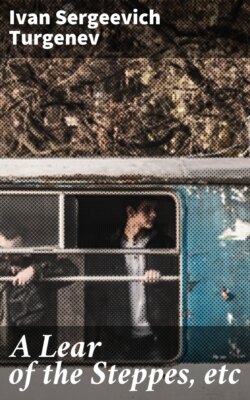Читать книгу A Lear of the Steppes, etc - Ivan Sergeevich Turgenev - Страница 11
На сайте Литреса книга снята с продажи.
II
ОглавлениеTable of Contents
My mother was exceedingly particular in her choice of acquaintances, but she made Harlov welcome with special cordiality and allowed him many privileges. Twenty-five years before, he had saved her life by holding up her carriage on the edge of a deep precipice, down which the horses had already fallen. The traces and straps of the harness broke, but Martin Petrovitch did not let go his hold of the wheel he had grasped, though the blood spurted out under his nails. My mother had arranged his marriage. She chose for his wife an orphan girl of seventeen, who had been brought up in her house; he was over forty at the time. Martin Petrovitch’s wife was a frail creature—they said he carried her into his house in the palms of his hands—and she did not live long with him. She bore him two daughters, however. After her death, my mother continued her good offices to Martin Petrovitch. She placed his elder daughter in the district school, and afterwards found her a husband, and already had another in her eye for the second. Harlov was a fairly good manager. He had a little estate of nearly eight hundred acres, and had built on to his place a little, and the way the peasants obeyed him is indescribable. Owing to his stoutness, Harlov scarcely ever went anywhere on foot: the earth did not bear him. He used to go everywhere in a low racing droshky, himself driving a rawboned mare, thirty years old, with a scar on her shoulder, from a wound which she had received in the battle of Borodino, under the quartermaster of a cavalry regiment. This mare was always somehow lame in all four legs; she could not go at a walking pace, but could only change from a trot to a canter. She used to eat mugwort and wormwood along the hedges, which I have never noticed any other horse do. I remember I always used to wonder how such a broken-down nag could draw such a fearful weight. I won’t venture to repeat how many hundred-weight were attributed to our neighbour. In the droshky behind Martin Petrovitch’s back perched his swarthy page, Maximka. With his face and whole person squeezed close up to his master, and his bare feet propped on the hind axle bar of the droshky, he looked like a little leaf or worm which had clung by chance to the gigantic carcase before him. This same page boy used once a week to shave Martin Petrovitch. He used, so they said, to stand on a table to perform this operation. Some jocose persons averred that he had to run round his master’s chin. Harlov did not like staying long at home, and so one might often see him driving about in his invariable equipage, with the reins in one hand (the other he held smartly on his knee with the elbow crooked upwards), with a diminutive old cap on the very top of his head. He looked boldly about him with his little bear-like eyes, shouted in a voice of thunder to all the peasants, artisans, and tradespeople he met. Priests he greatly disliked, and he would send vigorous abjurations after them when he met them. One day on overtaking me (I was out for a stroll with my gun), he hallooed at a hare that lay near the road in such a way that I could not get the roar and ring of it out of my ears all day.
